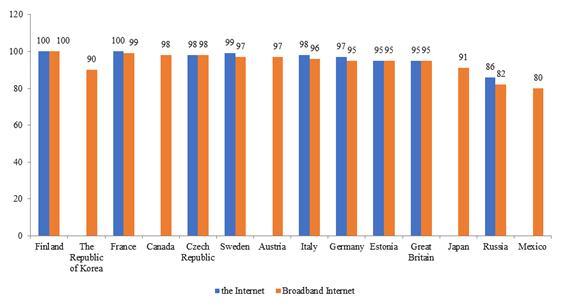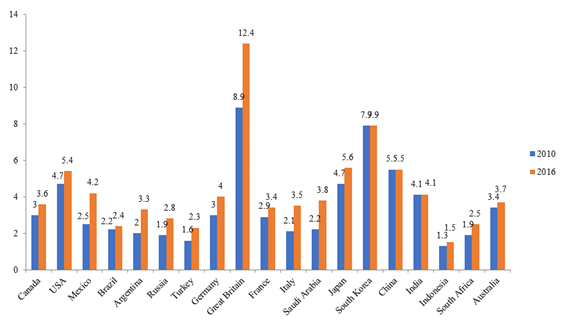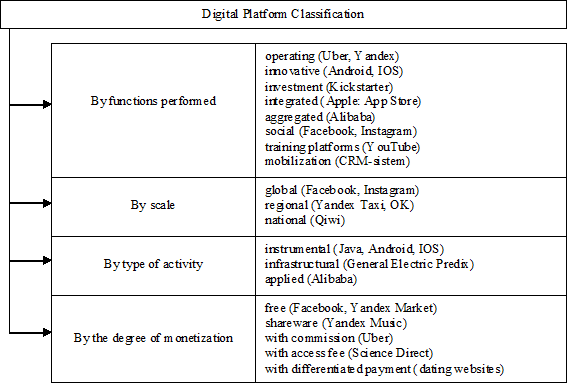Abstract
The article discusses the modern concept of the becoming of the digital economy in Russia. A comparative analysis of the becoming of the digital economy in Russia is carried out. The role of the state in promoting digitalization, both nationwide and within the boundaries of individual regions of Russia, is noted. The degree of implementation of state programs and projects aimed at the development of informatization and digitalization of society is shown. The article also contains the main government documents that were developed with the aim of maximizing assistance in the development of digitalization of all spheres of activity of the national economy. The platform concept of the development of the digital economy and the types of digital platforms are considered. The main advantages are highlighted and the disadvantages of using digital platforms are noted. The necessity of digital transformation for both individual companies and private sector consumers is justified.
Keywords: Digital economydigital platformtransformationdevelopment
Introduction
An important factor in the sustainable economic development of Russia in modern economic conditions is the introduction of innovations based on digital technologies. This necessitates the transition to a new technological structure of all aspects of the life of society, including the economy. The main distinguishing feature of modern transformation processes is the acquisition by information of real characteristics as a factor in production, goods, and exchange methods. Therefore, effective management of the Russian economy in modern society is impossible without considering the transformation of the national economy into an economy based on the widespread use of digital technologies.
Problem Statement
According to the data provided in the Digital Economy of the Russian Federation Program, the potential effect of the digitalization of the country's economy is estimated by experts at 4.1–8.9 trillion. rub. by 2025, which will be 19–34 % of the total increase in GDP (Government of the Russian Federation, 2017). Given the importance of the development of the digital economy for the country, it is necessary not only to study the level of its formation, but also to consider the modern concept of the becoming of the digital economy.
The problems of digitalization and informatization of economic processes, in view of the insufficient understanding of these concepts, are repeatedly addressed by both foreign and domestic scientists: N.V. Apatova, E.V. Nalyvaichenko, S.P. Kirilchuk, O.M. Pisareva, V.Yu. Anisimova, C. Markides, T.S. Kuprevich, M.Yu Arkhipova and others.
However, the versatility, relative novelty, and relevance of this topic determine the need for further research aimed at a more detailed study of its aspects, taking into account the transformation of the modern business environment.
Research Questions
The subject of the article is the processes and components of the becoming of the digital economy of Russia on the basis of the concept of building digital platforms, as well as business transformations defined by the digitalization of society.
Purpose of the Study
The purpose of the article is a comparative analysis of the level of formation of the digital economy in Russia and consideration of the modern concept of the becoming of the digital economy of Russia through the formation of digital platforms.
Research Methods
As research methods used analysis and synthesis, systematization and structuring of the main areas of research.
Findings
The digital economy is an area of human activity that is developing at an accelerated pace, which, according to experts, will radically change existing business models and familiar mechanisms for implementing economic relations.
However, despite the fact that in Russia the digital economy only developed at the beginning of the 21st century, the term was first coined in 1995 by Nicholas Negroponte, an IT specialist at the University of Massachusetts, who defined it as a process of transition from analog form of transmission, processing and storage of data to digital (Nalivaychenko, 2019).
The Program “Digital Economy of the Russian Federation” contains the following definitions of this concept: “Digital economy is a set of social relations that develop when using electronic technologies, electronic infrastructure and services, technologies for analyzing large volumes of data and forecasting in order to optimize production, distribution, exchange, consumption and raising the level of socio-economic development of states”(Government of the Russian Federation, 2017).
That is, in fact, the digital economy is a form of economic production that uses digital (electronic) technology, in which the virtual part of the economic life of business entities has become the environment where innovative ideas and products are created.
Figure

According to Figure
The number of broadband Internet subscribers is also growing in the segment of private individuals. So, according to TMT Consulting, in 2018 their penetration reached 33.2 million, which is 1.5 % more than in 2017, and the market volume in 2018 amounted to 134.8 billion rubles (Yakimenko, 2019). The share of the digital economy in the country's GDP is also growing (Figure

According to the data presented, the leading position regarding of the digital economy in the country's GDP is occupied by the UK 12.4%. Russia, on the other hand, is in 15th place with an indicator of 2.8%, or $ 75 billion, ahead of only South Africa, Turkey, Brazil, and Indonesia. The largest share – 2.35% (63 billion US dollars) is represented by income from the sphere of consumption. So, online sales in all sales amounted to 43 billion US dollars, and the overall cross-industry effect of digitalization has increased 5.5 times since 2010 and amounted to 27.7 trillion in 2016 rubles (Nalivaychenko & Kirilchuk, 2017).
The indicated positive changes in the becoming of the digital economy of Russia are primarily associated with the growth of bank card transactions, the introduction of electronic trading platforms, the increase in ROPO and online advertising segments (Nalivaychenko, 2019), with full support from the state, which is manifested in the formation of legislative framework, the creation of technical conditions and the financing of educational and scientific programs both at the federal and regional levels (Government of the Russian Federation, 2010).
According to the results of monitoring the regional IT budgets of the Center for Expertise and Coordination of Informatization, “the total amount of financing of activities on informatization and digitalization in the regions of Russia in 2018 amounted to 100 billion rubles, which is 17.6% more than the amount of financing in 2017”. The leaders in financing digitalization in the regions are Moscow – 49.9 billion rubles, St. Petersburg – 10.1 billion rubles, Moscow Region – 5.2 billion rubles, Khanty-Mansi Autonomous Area – 2.6 billion rubles, the Republic of Tatarstan – 1.8 billion rubles (Arkhipova & Sirotin, 2019).
Mostly financial resources are directed to the development of the basic communications infrastructure, digitalization of public administration, the creation of industry information systems in order to increase the level of accessibility of digital services for the population and business.
Note that digitalization in Russia is based on the application of the platform concept, the central core of which is the digital platform.
“A digital platform is a business model based on electronic technologies, the purpose of which is to provide coordination services for market participants”(Pisareva, 2019, p. 302).
That is, in fact, the digital platform is a virtual marketplace that provides direct interaction between the manufacturer and the end user (Figure

So, the digital platform provides companies with their resources and capacities, and allows them to conclude direct transactions (transactions without an intermediary) to the producer and consumer without any geographical restrictions.
The classification of digital platforms is shown in Figure

It should be noted that regardless of the type of digital platform is always customer-oriented, and their work is based on two essential principles, these are:
- everything-as-a-service;
- pay-as-you-go.
Using digital platforms has both advantages and disadvantages. Positive for participants in the transaction will be the speed of search, transaction and payment of the transaction, regardless of their location.
However, using a digital platform, the parties to the transaction should also understand the possible risk of its implementation, as manufacturers lose control of distribution channels and become dependent on digital platforms, and consumers can become victims of Internet scammers who steal personal data (Panin, Zheleznova, Lapaeva, & Novikova, 2019).
Therefore, both companies and private sector consumers need a digital transformation, which should be understood as a deep transformation of the existing closed system into an open one based on the use of digital technologies.
Conclusion
Thus, the becoming of the digital economy in Russia is a priority, since digitalization is the basis for a qualitative change in the structure of the economy and long-term opportunities, such as reducing unemployment and creating innovative jobs, reducing production costs and increasing labor productivity in conditions of complete consumer satisfaction.
As a modern concept for the becoming of the digital economy in Russia, a platform concept is used, which involves the use of digital platforms and requires the traditional business of digital transformation and the introduction of innovative business models.
To promote the development of the digital economy, state support is needed, which is manifested in the development of state programs, the financing of scientific discoveries, the support of educational programs, and the provision of material and technical means both at the federal and regional levels. Also, the digital economy should be accompanied by constant investments from the state and the private sector on the terms of mutually beneficial partnership.
References
- Abdrakhmanova, G. I., Vishnevsky, K. O., & Gokhberg, L. M. (2019). Digital economy: 2019: a brief statistical compilation. Moscow: HSE.
- Anisimova, V. Y., & Semerkova, L. N. (2018). Development of digital platforms and information technologies in the Russian Federation. Bulletin of Samara University. Economics and Management, 9(4), 7.
- Arkhipova, M. Y., & Sirotin, V. P. (2019). Regional Aspects of the Development of Information, Communication and Digital Technologies in Russia. Regression Econmy, 15(3), 670.
- Government of the Russian Federation. (2010). State program of the Russian Federation “Information Society” (approved by Order of the Government of the Russian Federation of October 20, 2010 No. 1815-r). Retrieved from: https://digital.gov.ru/ru/activity/programs/1/ (accessed: 01/16/2020).
- Government of the Russian Federation. (2017). The program “Digital Economy of the Russian Federation” (approved by Order of the Government of the Russian Federation of 28 July 2017 no. 1632-r). Retrieved from: https://digital.ac.gov.ru/ (accessed: 01/17/2020).
- Kuprevich, T. S. (2018). Digital platforms in the global economy: current trends and development directions. University Econmy Bulletin Collection of science works of science and graduate students, 37-1, 311.
- Nalivaychenko, E. V. (2019). The development of the digital economy in the context of globalization. Simferopol: ARIAL.
- Nalivaychenko, E. V., & Kirilchuk, S. P. (2017). The Development of Globality of innovative Modifications. Journal of Fundamental and Applied Sciences, 9, 1025.
- Panin, D. N., Zheleznova, P. V., Lapaeva, O. S., & Novikova, D. D. (2019). Digital security of smart cities. International Research Journal, 11(89), 31.
- Pisareva, O. M. (2019). Composition and characterization of meaningful statements of strategic planning tasks: analysis of changes in the context of the formation of a digital management platform. Modernizat. Innovat. Development (MIR), 10(3), 302.
- Yakimenko, I. (2019). TMT RATING Broadband Market B2C – 2018. Moscow: TMT Consulting.
Copyright information

This work is licensed under a Creative Commons Attribution-NonCommercial-NoDerivatives 4.0 International License.
About this article
Publication Date
07 December 2020
Article Doi
eBook ISBN
978-1-80296-095-2
Publisher
European Publisher
Volume
96
Print ISBN (optional)
-
Edition Number
1st Edition
Pages
1-833
Subjects
Management, human resources, resource efficiency, investment, infrastructure, research and development
Cite this article as:
Shevchenko, E. V., Efremova, A. A., Oshovskaya, N. V., Artyukhova, I. V., & Dementiev, M. Y. (2020). The Modern Concept Of The Becoming Of The Digital Economy In Russia. In A. S. Nechaev, V. I. Bunkovsky, G. M. Beregova, P. A. Lontsikh, & A. S. Bovkun (Eds.), Trends and Innovations in Economic Studies, Science on Baikal Session, vol 96. European Proceedings of Social and Behavioural Sciences (pp. 551-557). European Publisher. https://doi.org/10.15405/epsbs.2020.12.72

